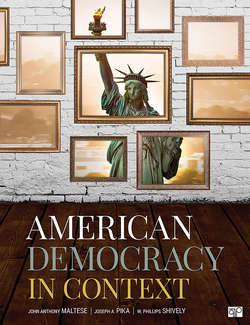Читать книгу American Democracy in Context - Joseph A. Pika - Страница 60
На сайте Литреса книга снята с продажи.
The Boston Tea Party
ОглавлениеAs it had done with the Stamp Act, Britain backed down in the face of the colonial reaction to the Revenue Act. The colonists boycotted the imported goods that were subject to duties, and in 1770, Britain rescinded the duties for all goods except tea. Colonists evaded the remaining tea tax by buying smuggled tea from Holland, but Parliament foreclosed that option in 1773 when it passed the Tea Act. The primary purpose of that act was to save the nearly bankrupt East India Company by giving it a monopoly to sell tea in the colonies. Parliament lowered the price of tea so much that the tea from the East India Company—even after the tea tax—was cheaper than smuggled tea. Parliament assumed that the colonists would welcome the inexpensive tea. Instead, the colonists viewed it as a trick to get them to accept British taxation and tried to block British ships bringing the tea from the East India Company. In many cases, this blockade worked, but in Boston, a British ship refused to leave the harbor without unloading its cargo of tea and collecting the duty on it. The showdown led, on December 16, 1773, to the Boston Tea Party, in which a group of colonists disguised as Mohawk Indians boarded the ship and dumped all 342 chests of tea into the harbor. This act of defiance marked an important step toward revolution.12
Parliament responded to the Boston Tea Party by passing a series of measures in 1774 known as the Coercive Acts (or, as the colonists liked to call them, the Intolerable Acts), designed to punish Massachusetts. Among other things, the Coercive Acts closed Boston Harbor to all commerce until Britain received payment for the destroyed tea, brought the Massachusetts government under full British control, forbade most town meetings, and allowed British troops to be quartered in private buildings and homes in Boston.
